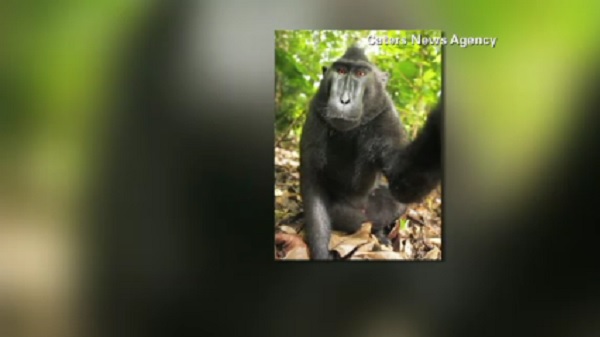Selfie monkey should own photo copyright, PETA says
This led to the infamous monkey selfie taken by one of the crested black macaques named Naruto, which shows him smiling right into the camera.
It is one of those photos that is at the center of PETA’s federal lawsuit.
Englehardt is a scientist who has known, monitored and studied the monkey since his birth.
Photographer David J. Slater was taking pictures of endangered crested macaques in Indonesia when he temporarily left his camera on his tripod.
While the claim of authorship by species other than homo sapiens may be novel, “authorship” under the Copyright Act, 17 U.S.C. § 101 et seq., is sufficiently broad so as to permit the protections of the law to extend to any original work, including those created by Naruto. It is the ownership of these images that has the photographer and this Indonesian monkey at odds in court.
Last year, the U.S. Copyright Office issued an updated compendium of its policies, including a section stipulating that it would register copyrights only for works produced by human beings.
Of course the monkey who snapped these pictures isn’t actually in the courtroom, but PETA is there representing the monkey and his rights to these pictures.
“Why do PETA and WIkimedia target Individuals when they want free rights to commercially exploitable images?”
Slater has been openly dismayed by the prolonged dispute over the photos, and says the British copyright obtained for the photos by his company, Wildlife Personalities Ltd., should be honored worldwide.
“I am obviously bemused at PETAs stunt but also angry as well as sad”, Slater wrote.
In the case, PETA seeks “declaratory judgment, damages for copyright infringement, a permanent injunction to stop sales and licensing of the photos, and disgorgement of profits from them”, according to Courthouse News.
In the lawsuit PETA is also asking the federal court award the copyright to the money, although the statute of limitations on copyright law is three years and the selfie was taken more than four years ago.
It must be fixed in a tangible medium. “Overall, originality is a low threshold, and probably satisfied by the macaque’s selfie”, Cevallos wrote.
PETA Director Mimi Bekhechi says: “If PETA USA prevails in this lawsuit, it will be the first time that a non-human animal is declared the owner of property, rather than being declared a piece of property himself or herself”. Works “created” by nature including animals have no legal author and, therefore, are not copyrightable.
For now, it looks like Selfie Monkey will remain in the public domain.








